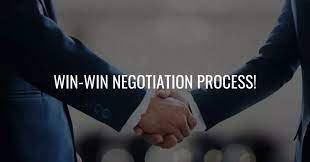
Good Day Readers, Today we will be discussing our second type of Opponent which is “Visceral Opponents“
We have observed that Idea Opponents can be addressed on an intellectual level with factual and descriptive comments. In this climate, despite the difference in the initial viewpoint of the parties, creative problem solving can take place.
A Visceral Opponent is an emotional adversary, who not only disagrees with your point of view, but disagrees with you as a human being. He may even attribute sinister or nefarious motives to the position you espouse.
In this climate, there is inordinate stress, judgments are formed, accusations may be made, and scorekeeping takes place. Obviously, this is not a fruitful environment in which creative problem solving can take place.
Once you make visceral problem opponents, they tend to stay with you for a long time, for they are difficult to convert. All the logic, facts, ideas, and evidence you marshal will not be enough. So try not to bring them into being in the first place. Avoid producing a visceral opponent the way you would avoid a contagious disease.
The next obvious question is how you make ( or transform ) someone into a visceral opponent. Attacking “Face” is what causes someone to become an emotional enemy.Face Sense is who I want others to think I am. It’s how a person wants to be seen publicly. When I am concerned with my saving face after a difficult negotiation, I want to make sure that the stature I have always projected in terms of Prestige, Worth, Dignity, and Respect will not be diminished.
Self-Image, on the other hand, is concerned with how a person sees himself in the privacy of his own head. It is who you think you are. The conception that you alone have of yourself, your abilities, your value, and your role.
The two concepts overlap, but only slightly. Briefly, they can be distinguished if we refer to one’s public face sense, as distinct from one’s private self-image.
For the sake of further clarification, let’s say that in a private discussion I attacked you personally by calling you a fraud, a clown, and a liar. This offensive, though unprovoked attack might have momentarily annoyed you, but your self-image is undoubtedly strong enough to withstand even this abuse.
As you walked away, shaking your head, you might even have thought, “This fellow is not only obnoxious, but he’s sick!” In addition, if I came to my senses the next day and sincerely apologized for my aberration, you might even forgive me, since we were the only people involved.
Now let’s assume that during a public meeting, or in front of your associates, I made a similar blistering assault, calling you a fraud, a clown, and a liar. Although your self-image would reject my charges as totally unjustified, you will sustain loss of face and wounded pride.
At this point you probably will start keeping score, saying to yourself, “That’s one, two, or three I owe that creep.“
Suppose, I were to visit you the next day, begging your forgiveness for my temporary derangement? Chances are that my apology would not be accepted. Not only does wounded pride produce a tenacious enemy, but the onslaught was made in public, and i’m trying to make amends in Private.
People will go to extreme lengths to avoid loss of face. We all display a remarkably ability to protect ourselves in such situations, from distortion and rationalization to blocking out the episode entirely. In other words of a song that was popular some time ago, “What is too painful to remember, we simply choose to forget.“
10 years ago, I was acquainted with an executive who was unexpectedly fired by his organization after many years of faithful service. He never informed his family or friends of his discharge.
Every morning at the usual time, carrying his briefcase, he boarded the train at his suburban station and was transported into Manhattan. Thereafter, he spent endless days in the motion picture houses in Times Square or at the Public Library, waiting until it was time to catch his regular train home.
It was almost 2 months before the make-believe world he concocted cam apart, when his uninformed wife made an unforeseen phone call to the office. The story is tragic, but it points out the incredible illusions that we are all capable of putting in place to protect our stature in the eyes of the people we care about.
In reading the plays of Eugene O’Neill and Tennessee Williams, you will find that this is a recurring theme — the maintenance of make-believe and pipe dreams to protect “Face sense.“
Keeping in mind the desperate and irrational behavior that individuals may employ to save face, we must avoid any possible public embarrassment to the people with whom we dealt. You must train yourself to speak honestly to idea opponents without offending face sense.
You must be able to make your point and present your case without making a visceral enemy. You must always keep in mind the physical law that “For every action there is a reaction.” The gist of this was verbalized by Bernard Baruch when he said, “Two things are bad for the heart — running upstairs and running down people.“
Emphasizing the consequences and risks involved in making a visceral opponent, 2 instances come in mind:
By saying this, We will discuss further in next Part of :
“Visceral Opponents (Part 2)“
Do not Forget to Follow my Website for Future Updates
[…] of Opponents “ Idea Opponents“. In Next we are going to discuss our Second Form.“Visceral Opponents“Do not Forget to Follow my Website for Future […]